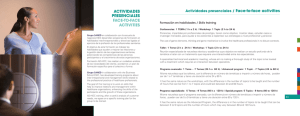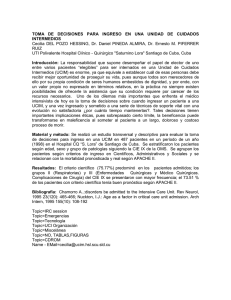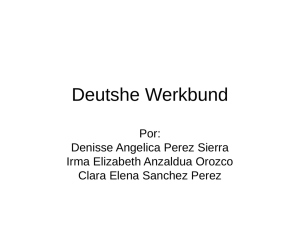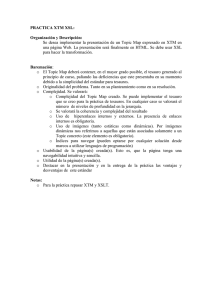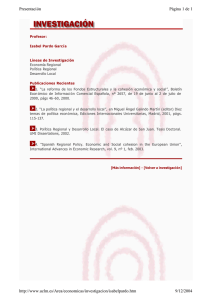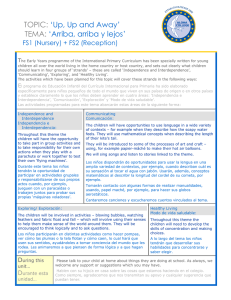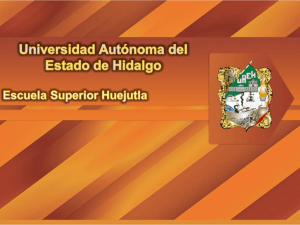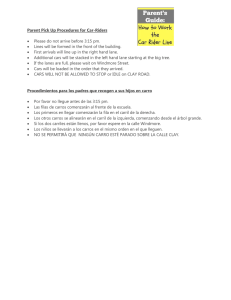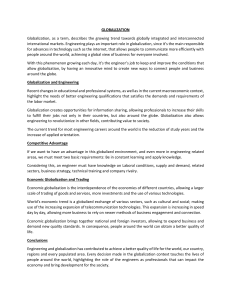6 COURSE GUIDE Subject information SPECIFIC DETAILS OF
Anuncio
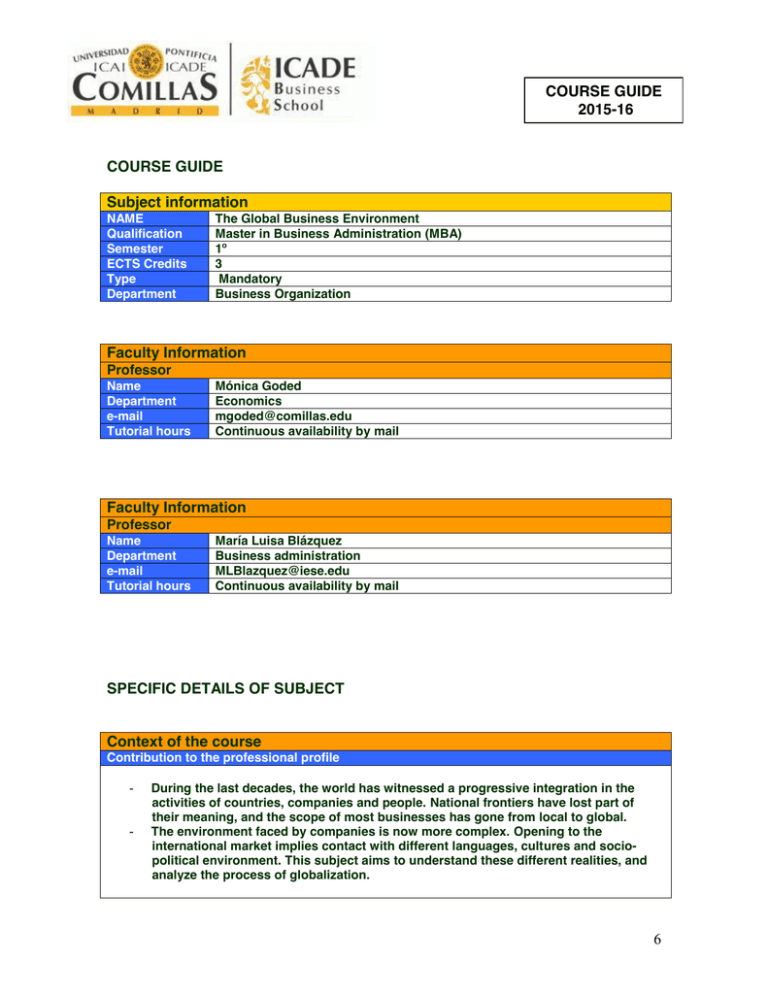
COURSE GUIDE 2015-16 COURSE GUIDE Subject information NAME Qualification Semester ECTS Credits Type Department The Global Business Environment Master in Business Administration (MBA) 1º 3 Mandatory Business Organization Faculty Information Professor Name Department e-mail Tutorial hours Mónica Goded Economics [email protected] Continuous availability by mail Faculty Information Professor Name Department e-mail Tutorial hours María Luisa Blázquez Business administration [email protected] Continuous availability by mail SPECIFIC DETAILS OF SUBJECT Context of the course Contribution to the professional profile - During the last decades, the world has witnessed a progressive integration in the activities of countries, companies and people. National frontiers have lost part of their meaning, and the scope of most businesses has gone from local to global. The environment faced by companies is now more complex. Opening to the international market implies contact with different languages, cultures and sociopolitical environment. This subject aims to understand these different realities, and analyze the process of globalization. 6 Objectives - Contribute to a clear and rigorous visión of the globalization process and its different aspects. Introduce the student in the economic analysis of developing countries, its particular features and relationship with developed countries. Provide the student with the necessary tools for economic analysis in order to understand the processes of financial and commercial opening. TOPIC BLOCKS AND CONTENT BLOCK 1: TOOLS FOR ECONOMIC ANALYSIS TOPIC 1: MEASURING ECONOMIC ACTIVITY 1.5 1.6 1.7 1.8 Main indicators Evolution Purchasing Power Parity Growth or development? TOPIC 2: FUNCTIONING OF MARKETS 2.4. Supply and demand 2.5. Types of markets 2.6. Types of goods TOPIC 3: THE EXTERNAL SECTOR OF THE ECONOMY 3.5. 3.6. 3.7. 3.8. Structure of the Balance of Payments Interpretation of the Balance of Payments The Exchange rate External balance and economic policy options TOPIC 4: ECONOMIC IMBALANCES 4.4. Socio-economic scope 4.5. Financial scope 4.6. Fiscal scope BLOCK 2: GLOBALIZATION AND BUSINESS TOPIC 5: THE INTERNATIONAL SCENARIO 5.5 5.6 5.7 5.8 How to classify countries? A world of contrasts Towards a multipolar international scenario Recent evolution of the international economic environment 7 TOPIC 6: GLOBALIZATION 6.4. What is globalization? 6.5. Driving factors 6.6. The controversial debate on its effects TOPIC 7: INTERNATIONAL TRADE 7.4. Trends on international trade 7.5. Regulation of international trade: WTO 7.6. The debate on international trade: explanatory factors and effects TOPIC 8: THE GLOBALIZATION OF CAPITAL 8.5. 8.6. 8.7. 8.8. Origin and evolution of international financial markets International financial institutions Foreign direct investment: explanatory theories, impact and regulation Instability and financial crisis Skills General skills of the degree-course CG1. Capacidades cognitivas de análisis y síntesis aplicadas a situaciones de negocios y problemáticas organizativas de gestión. RA 1. Describe, relaciona e interpreta situaciones y planteamientos de nivel medio. RA 2. Selecciona los elementos más significativos y sus relaciones en las situaciones planteadas. RA 3. Identifica las carencias de información y establece relaciones con elementos externos a la situación planteada. RA 4. Es capaz de resumir y estructurar la información empleando los conceptos adecuados. CG 2. Gestión de la información y de datos como elementos clave para la toma de decisiones y la identificación, formulación y resolución de problemas empresariales. RA 1. Busca, conoce, sintetiza y utiliza adecuadamente datos primarios y secundarios procedentes de diversas fuentes. RA 2. Conoce y usa Internet para buscar y manejar información, textos y datos. RA 3. Discierne el valor y la utilidad de diferentes fuentes y tipos de información. CG 8. Razonamiento crítico y argumentación acorde con la comprensión del conocimiento y del saber sobre las organizaciones empresariales, su contexto externo y su proceso de administración y dirección. RA 1. Identifica, establece y contrasta las hipótesis, variables y resultados de manera lógica y crítica. RA 2. Revisa las opciones y alternativas con un razonamiento crítico que permita discutir y argumentar opiniones contrarias. CG 9. Capacidad de aprendizaje autónomo para seguir formándose para aprender las habilidades cognitivas y los conocimientos relevantes aplicadas a la actividad profesional y empresarial. RA 1. Realiza sus trabajos y su actividad necesitando sólo unas indicaciones iniciales y un seguimiento básico. RA 2. Busca y encuentra recursos adecuados para sostener sus actuaciones y realizar sus trabajos. RA 3. Amplía y profundiza en la realización de sus trabajos. 8 Specific skills of the degree-course CE2 – EL ENTORNO GLOBAL DE LOS NEGOCIOS - Capacidad de comprender y analizar las dimensiones económica, social, cultural, política, jurídica y medioambiental del entorno internacional y su influencia en la determinación y elección de estrategias de internacionalización de la empresa RA1CE2 Comprende la trascendencia de la globalización para la supervivencia de las empresas. RA2CE2 Comprende las claves del contexto socio-económico, político y cultural que enmarcan la internacionalización de las organizaciones. RA3CE2 Argumenta y critica acerca de las distintas implicaciones éticas de la internacionalización empresarial. RA4CE2 Conoce y utiliza los principales modelos y herramientas disponibles para la identificación y valoración de las amenazas y oportunidades del contexto internacional de la empresa. TEACHING APPROACH General learning and teaching approach Class-based activities: Actividades The course will be taught through: - Lectures, in which the professor will present the content, with audiovisual methods, and will promote a debate on the concepts discussed. - Case-study sessions, in which cases will be analyzed by students working in groups or individually. This sessions will imply the study of specific cases, research, analysis of questions posed by the professor and presentation and debate of proposals. Competencies CG1; CG2; CG8: CG9; CE2 CG2; CG8; CG); CE2 Outside classroom activities Competencies Students must supplement basic theoretical knowledge acquired in class with readings suggested by professors, as well as conduct research for some of the scheduled activities. CG2; CG8; CG9; CE2 ASSESSMENT AND GRADING CRITERIA Assessment activities Final individual exam Oral presentation Individual active participation in class discussion Analysis of case studies Weight 50% 10% 10% 30% 9 Students will have two opportunities to pass the subject: one during the teaching period and another during the exam period that will take place in July 2016. In order to pass the subject during the teaching period a minimum grade of “5” is required on each of the assessment activities described above. Those students who have not passed the subject in the first evaluation period will have to repeat the exam on the July re-sit summon. Grades obtained by the student on the rest of assessment activities – with its correponding weights- will be maintained on this second evaluation. SUMMARY OF STUDENT WORKING HOURS ATTENDANCE HOURS Theoretical sessions Practical sessions Academically supervised activities Assessment 20 5 3 2 NON ATTENDANCE HOURS Self-study on theoretical concepts Self-study on practical contents Group work Study 10 5 10 20 ECTS CREDITS: 3 BIBLIOGRAPHY AND RESOURCES Basic bibliography Text books Krugman, Paul; Wells, Robin; Graddy, Kathryn. (2015). Fundamentos de Economía. Ed. Reverté. Hill, Charles; Udayasankar, Khrisna y Wee, Chow Hou (2014). Global Business Today. Mc Graw Hill. Supplementary bibliography Text books De la Dehesa, Guillermo (2007). Comprender la Globalización. Alianza editorial. Krugman, Paul (2013). Economía Internacional. Pearson. Todaro, Michael y Smith, Stephen (2014). Economic Development. Pearson. Acemoglu, Daron y James, Robinson (2012). Why Nations Fail: the origin of power, prosperity and poverty. Crown. 10
